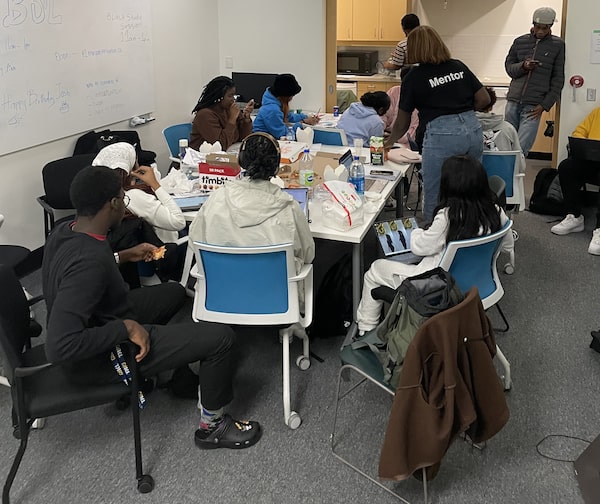
Students mingle at the Black Student Lounge at Toronto Metropolitan University in Toronto in a handout photo.HO
Spaces designated for students from marginalized backgrounds are spreading across Canadian universities, as officials say they are a necessary and overdue response to decades of racism on campus.
Toronto Metropolitan University officially opened a space late last month for students who self-identify as Black.
Cheryl Thompson, an associate professor at the university, said the need for such lounges became increasingly clear following the death of George Floyd, whose 2020 killing by a white Minneapolis Police Department officer sparked protests worldwide.
“Something did shift in 2020 institutionally … when the world witnessed the inhumanity in that George Floyd video,” Thompson said about the Black man who was seen in a video using his last few breaths telling the officer kneeling on his neck, “I can’t breathe.”
“The demands Black students have been making for decades have finally been heard.”
Eboni Morgan, a spokesperson for TMU’s lounge, said the decision to create the room stemmed from a recommendation in a 2020 Anti-Black Racism Campus Climate Review Report that surveyed Black members of the school community. It found they continue to face systemic racism by institutions and their peers.
The lounge – equipped with a kitchen, other facilities and a mural painted by a Black student artist – can fit up to 25 students at a time.
“It’s a beautiful community to watch unfold,” Morgan said. “It’s been loud, exciting and students are constantly in the space.”
Thompson said that in the lounge, “you can let your guard down and have conversations about things you’re going through … like support groups for people who have suffered trauma.”
“One of the reasons why young people struggle with their mental health is because they think they’re the only ones to go through what they’re going through,” she said. “Having these spaces makes you more confident and say, ‘oh, I’m not alone.”’
Across the city, York University – Canada’s second-largest – launched a lounge for Black students in January. The University of Winnipeg’s BIPOC lounge for students who are Black, Indigenous and people of colour opened in 2018.
The University of British Columbia launched a space for Black male students last year, said Ainsley Carry, the vice-president of students at UBC.
Carry said UBC’s Black Male Initiative, is “believed to be the first-of-its-kind program at a Canadian university,” and was designed to provide “a confidential space on campus for members to connect to other Black male students where they can share their lived experiences.”
He said the pilot program has been well received.
“We recognize there is underrepresentation of the Black population at UBC, and that Black community members may feel isolated or face challenges not experienced by their non-Black peers,” Carry said.
“That is why UBC is taking steps … to help foster a sense of belonging … for Black community members.”
Morgan added TMU has received some emails blasting its lounge as “segregationist.”
Thompson said she has not seen those emails but dismissed the charge as “foolishness,” arguing such accusations could only have been written by people who had no knowledge of what a system of segregation is.
Thompson said the type of racism Black people experience is different than other marginalized groups
“Anti-Black racism is not dependent on even being Canadian. It has nothing to do with your citizenship.”
Providing students with safe spaces is crucial to fostering their development, she said.
One critic of the lounges is Adaeze Mbalaja, the president of the York Federation of Students. She has accused school administrators of using the spaces to mend reputations tarred by years of underfunding Black student groups.
“This is a trend of performative justice, performative activism by institutions across Canada,” she said.
Mbalaja said that based on her discussions with other Black student associations in the Toronto area, she believed universities were creating spaces for Black students but leaving Black students groups underfunded “to fend for themselves.”
“If you’re going to support Black students, do that in a way that is genuine and in a way that desires to actually uplift and amplify the community.”
Thompson said such criticism was “healthy.”
“Universities, instead of dismissing that, need to really ask themselves, ‘Oh, where are they coming from?’ ‘Maybe we do need to have more open lines of communication.”’
Editor’s note: An earlier version incorrectly said a university professor had confirmed criticism sent to TMU regarding its Black student lounge. In fact, a lounge spokesperson confirmed the criticism. An earlier version also carried incorrect pronouns for Ainsley Carry. This version also clarifies Carry’s title at UBC.